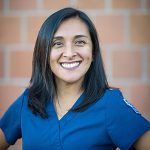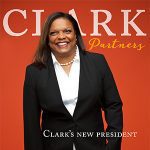Looking up, moving forward
Written by Deon Gillespie Photography by Craig Mitchelldyer ’00
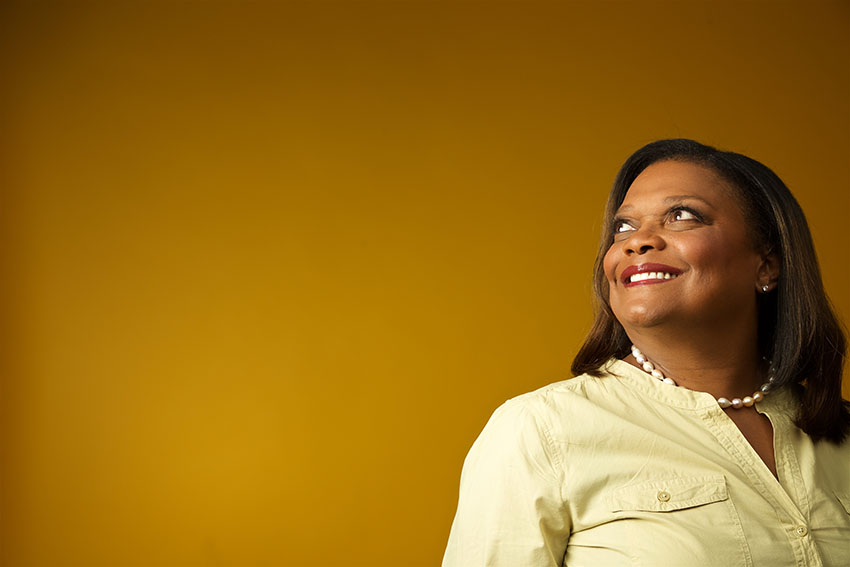
Dr. Karin Edwards, president of Clark College, is looking up and moving forward. Photo by Craig Mitchelldyer ’00
Over the last 36 years, Dr. Karin Edwards has seen the impact of building relationships. She has watched students make meaningful changes in their communities. For some, those changes put their lives on a path toward complete transformation. They have great stories to tell. For Clark College’s new president, few things are more personally satisfying than listening to students tell their own inspiring stories.
“You’d be surprised how many students are so happy just to hear you say, ‘I’m so glad you’re here.’ And I haven’t done anything yet. It’s that simple.”
Edwards may feel like she hasn’t done anything yet, having landed in her post in June of this year. However, you would be hard-pressed to hear that from others, including students.
“She seems down to earth, like she really cares about me—about the students,” says Josiah Joner, this year’s president of the Associated Students of Clark College. Joner first met Edwards at the photo session for this story. Even though they missed their attempt at elbow bumping the two were quickly laughing and chatting about Joner’s promising, albeit challenging, first year as a full-time college student.
“I know this institution has a lot of hurdles to get over,” Joner says. “But with her, it really feels like it’s about looking up and moving forward, and that makes me feel a lot better.”
Being steadfast and willing to take on life’s challenges seems to be a hallmark of Edwards’ character. Having faced adverse circumstances herself, Edwards seems undaunted when it comes to helping shape Clark College’s next chapter, despite declining enrollments, budget deficits and a worldwide pandemic.
The adversity she has overcome appears to have given Edwards the courage, confidence and determination to help others move forward. Whether she is talking to faculty, staff or students, her message is simple.
“Number one, you’re worth it and number two, you can.”
One teacher can make the difference
Her journey began with tough decisions, taking risks and seizing opportunities. Edwards and her seven siblings were raised in New York City’s South Bronx housing projects where her parents had relocated from Atlanta.
In the early 1900s, Blacks migrated from the South to major industrial centers of the East and upper Midwest to escape poverty, racism and Jim Crow laws mandating segregation.
Edwards says the families she grew up around didn’t give much thought to quality education.
“You just went to school because that’s what you were supposed to do.”
Nevertheless, something promising happened at that public school down the street from her South Bronx home. Moved and guided by a young girl’s potential, Edwards soon fell under the watchful eye of one of her first teachers.
“The first professional black woman I saw was my second-grade teacher, and that just impressed me. She cared a lot.”
As young Karin demonstrated a little extra ability, the teacher introduced her to gifted and talented programs. Edwards soon began to see things differently than others around her. While her parents valued education and were open to college for their kids, what was most important to them was that their children learn how to take care of themselves. Education emerged as a critical way to do just that because Edwards recognized the transformative power of education and what it could mean for her future. It’s the kind of discovery she is committed to passing along to others.
Growing up, Edwards was often met with opportunities to move further a little faster. When her seventh-grade science teacher noticed she needed more of a challenge, he recommended she consider a private school.
Edwards received A Better Life scholarship. “I was fortunate enough to be able to get money to go there and that is really what changed my world.” Even though she was still in New York City, it was like “living in two different worlds—from midtown Manhattan to the South Bronx.”
By the time she graduated from high school, Edwards had discovered that opportunities don’t always come together the same for one student as they do another. An Ivy League education did not mean as much to her as it did to some of her classmates.
“I didn’t have that same spirit about needing to be the best. I listened to my cousin and followed in her steps to the State University of New York.”
After graduation, Edwards began her career at Skidmore College, in Saratoga Springs, N.Y. Later, she accepted a community college position when her husband got a job in a more rural area of New York. Broader access to instructors, low-cost tuition, job readiness—she took note of the stark contrast between students who went from kindergarten to their senior year of high school preparing for college and those juggling multiple roles and challenges.
“Community college students were parents, they were employees, and they were caregivers. If I could help those students succeed and experience the power of education, that’s what I wanted to do. That’s where I felt like it was fulfilling for me.”
Goats, chickens and clean mountain air
After years of living and working on the East Coast, establishing herself as a respected national voice in community college education, Edwards was ready to take on new challenges on the other side of the country—the Pacific Northwest.
Folks didn’t think much about mountains, clean air or spending time in the great outdoors where she grew up. “I think I’d been to California twice in my life, maybe three times for a conference, and that was the extent of my travel and even my knowledge of the West,” Edwards recalls.
She suspects the mountains may have won her over when she first visited Portland in 2014 for a job interview. Whether it was the mountains, the clean air, the opportunity to lead students in an unfamiliar part of the country or all of the above, Edwards calls it a leap of faith to advance her career and accept the opportunity to be president of Portland Community College’s Cascade campus.
“Both of my children were grown and on their own so it was just me and my husband. I felt this was the time—if ever.”
She recalls her initial reaction to what appeared to be some of the quirkier aspects of Northwest life like people renting goats in place of lawnmowers, securing proper permits for owning more than three chickens, or assessing one’s carbon footprint. These were aspects of community Edwards and her husband, Raymond, had never considered before.
While chicken farming is not likely on her horizon, the Northwest lifestyle—and all of its distinctive attributes—has grown on her. After all, learning to appreciate difference is a big part of who she is, and it’s the reason after six years at Portland Community College, Edwards decided to take on what could end up being the biggest challenge of her professional career.
Clark’s first Black female president
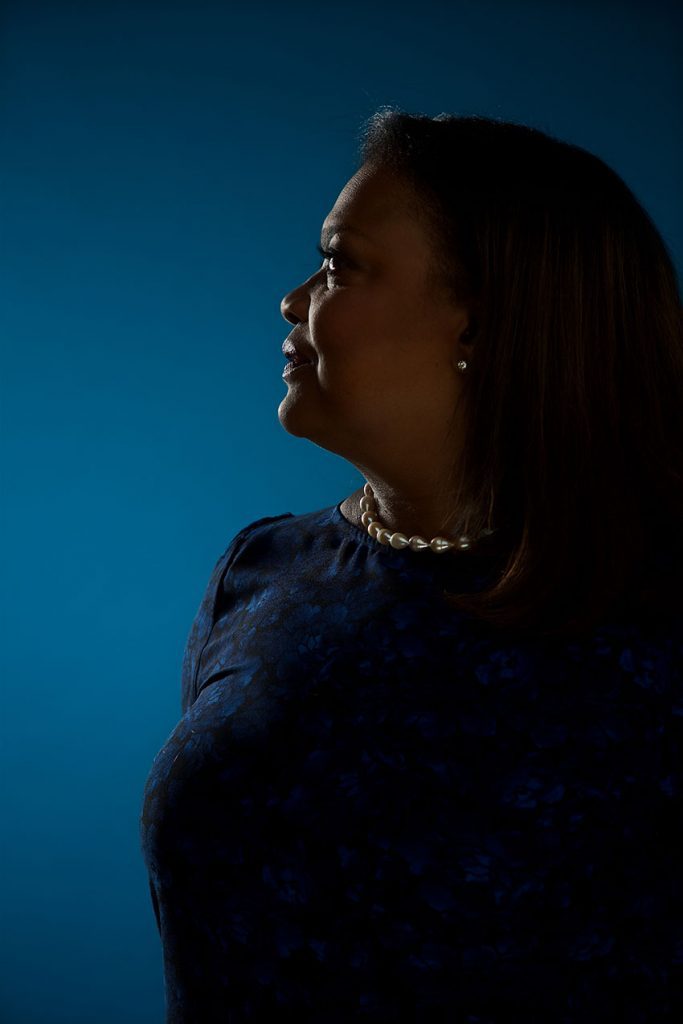
Dr. Karin Edwards, president of Clark College, says her eyes are wide open to the challenges Clark is facing. Photo by Craig Mitchelldyer ’00
After a rigorous yearlong search, the trustees of Clark College announced on February 21, 2020, that Dr. Karin Edwards would become the 15th leader of the institution in its 87-year history. She is the college’s first Black female president. For the college, her appointment is an important and forward-thinking development as the institution struggles to emerge from a difficult two-year period dealing with issues of diversity and inclusion.
People often ask Edwards why someone with her experience and tenure would take on the leadership role given the various challenges facing Clark. It is a question she seems genuinely comfortable with.
“I go in with my eyes open. I don’t go in with all the answers because each situation is unique,” she says. Whether it is a pandemic, racial inequity, political unrest or any other hurdle, Edwards believes one of the best things she can do is share her story, reminding others that educated individuals can change the world. For many, the best educational pathway is a community college.
Edwards knows her story alone will not bring about the structural change needed to secure Clark’s future well into the 21st century.
As she welcomed students, faculty and staff back to Clark during her Opening Day remarks in September, Edwards acknowledged the previous tumultuous year and outlined her roadmap for moving forward. Her priorities include increasing student graduation and completion rates, improving the student experience by helping them feel welcomed and valued, putting Clark on a stronger financial foothold, creating an inclusive and caring work environment, and ensuring the community is intrinsic to all of Clark’s efforts.
Student success is Clark’s top priority
While each of these priorities is important to her, Edwards often focuses on two: student success and community engagement. She believes she can help bring about considerable change in these areas because of her background and experience, and because the two are inextricably linked.
“We serve as a port of entry,” Edwards says. Not just for education, but for life. She acknowledges that community colleges in general, and Clark specifically, have been good at attracting students because of the institutions’ proximity, lower costs, solid curriculum and flexible class schedules. Holding on to students until they complete their studies is a different matter. More than 50% of students of color enter college through the community college system. Yet when it comes to retention and completion, Black and Brown men typically end up at the bottom. According to Clark’s statistics, overall completion rates for all students hover at around 25%. For men of color, the numbers are substantially lower.
For students, education must be seen as a balance between both windows and mirrors. In her article “Curriculum as Window and Mirror,” educator and writer Emily Style talks about how students feel validated by seeing themselves in mirrors, while at the same time learning more about the experiences of others by looking through windows. This is a concept that resonates with Edwards. She feels compelled to create educational experiences where students can see themselves represented in faculty and staff, as well as the curriculum and success stories. She believes this will help provide an impetus for students to finish what they started, despite the history of systemic barriers.
“They feel like ‘This is someplace I belong, where my culture and my background are appreciated,’” Edwards says. “That creates a better learning environment for everybody but particularly those who are looking for something to connect to.”
Community engagement
A critical area Edwards believes she can make a real difference is directly engaging the community in the experiences of college students. She is known at Portland Community College for connecting businesses and community leaders to students and their academic programs.
Some time ago, Edwards discovered the symbiotic relationship between community and students. Businesses and individuals can play a major role in helping reduce student debt through financial aid or providing profound internship opportunities, to name a few. Students, in return, become the workforce pipeline for businesses that are desperately in need of skilled employees. These students will become our leaders and influence the cultural climate throughout the region in a significant way.
“We don’t want our businesses recruiting from outside Vancouver or Clark County,” Edwards states emphatically. She recognizes that, unfortunately, this often happens despite the presence of a credible college located in the heart of the community. She is quick to acknowledge and thank the community for its generous support of Clark and its students over the years. She believes that by helping businesses and their leaders better understand the substantial barriers facing many students, both sides in this remarkable relationship can benefit, while building a stronger community together.
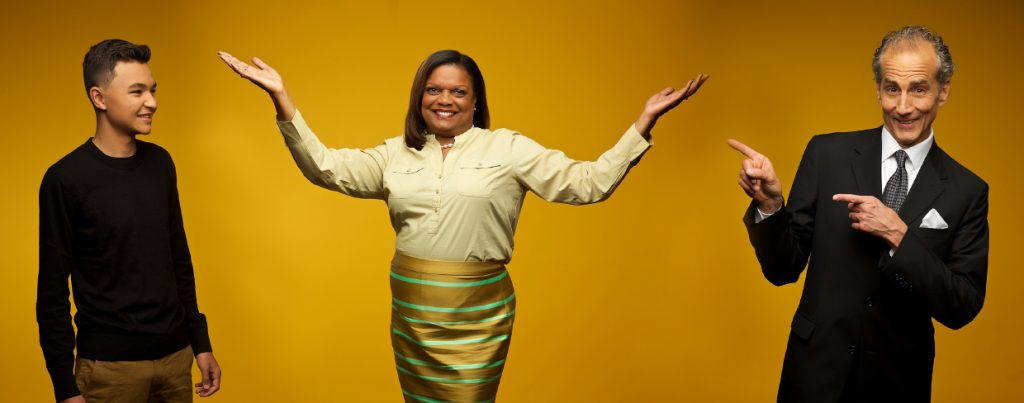
Introducing the three presidents at Clark. They are President Dr. Karin Edwards (center); Josiah Joner, ASCC president 2020-2021 (left); Jay Gilberg, president of Clark College Foundation’s Alumni Board (right).
This is music to the ears of many in the community, including Jay Gilberg, a local business leader and president of Clark College Foundation’s alumni relations program.
“We are so confident Dr. Edwards is the right person to help us build these sustainable partnerships,” Gilberg said with great enthusiasm. “Her efforts along with that of the college, the foundation and our fantastic alumni will not only strengthen Clark’s mission, but will engage the community while helping to fulfill Clark County’s workforce needs.”
The new president’s enthusiasm for strong community engagement has not only rubbed off on Gilberg and other community leaders, but it has also shifted some of the negativity that Clark and the community have endured recently. As an administrator, Edwards knows that her optimism has seen her through troubling times. Now she’s convinced that such optimism, focused on real needs, will create opportunities not just for today’s Clark students, but also for those children who are now entering kindergarten.
“We need to find ways to provide a seamless pathway for them so they know that once they finish high school, we want to make sure they’re ready to come right into classes at the community college,” she says.
COVID-19 and the future
While the mission remains the same, Edwards is the first to admit that COVID-19 has altered the pragmatics of doing her job. Transitioning from in-person to mainly remote operations is an ever-changing disruption when it comes to building relationships. The president knows better than anyone that the abrupt and constant sense of instability and fear impacting students, faculty and staff could be a barrier to most of her priorities. Dr. Edwards is determined, however, to continue reaching out with the same passion, vulnerability and honesty as she would under normal circumstances. That means direct, honest and respectful communication.
“I think it’s about allowing people to get comfortable with discomfort,” she says. “Being able to call things out and call people in.” She feels this way particularly when it comes to addressing barriers concerning race. “We just need to be prepared for that.”
Still, Edwards is certain Clark will build on its strengths as it always has. Redefining leadership in a crisis-driven environment comes with a willingness to adapt, when adapting is what she is known for.
“I have absolutely no control over what COVID-19 is going to do,” Edwards laments.
What she will do is continue to share her story—a story many people would not have expected to be written quite this way. Edwards believes everything she has ever done to this point has prepared her for stepping into this role.
“I want to see that same transformational power of education impact the lives of everyone in the Vancouver area,” she says with her characteristic smile.
“I want to see it that way for everyone.”
~~~~~
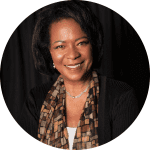 Raised in Utah by civil rights activists, Deon Gillespie now lives in Denver. Her advocacy work is focused on inclusion within the disability community. Appointed two terms to the Colorado Developmental Disabilities Council, she is also a member of the Parent to Parent of Colorado Advisory Board. Her writing earlier this year on an adaptive tennis program, “Rise to the Possible,” won national and international marketing awards for a Colorado group of creative professionals. Gillespie began her career as a television news writer and media relations consultant. She has a degree in journalism and mass communications from the University of Utah.
Raised in Utah by civil rights activists, Deon Gillespie now lives in Denver. Her advocacy work is focused on inclusion within the disability community. Appointed two terms to the Colorado Developmental Disabilities Council, she is also a member of the Parent to Parent of Colorado Advisory Board. Her writing earlier this year on an adaptive tennis program, “Rise to the Possible,” won national and international marketing awards for a Colorado group of creative professionals. Gillespie began her career as a television news writer and media relations consultant. She has a degree in journalism and mass communications from the University of Utah.
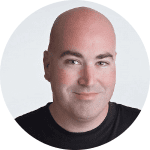 Photographing the new president of his alma mater was not a job that ever occurred to Craig Mitchelldyer ’00, but now he considers it one of the highlights of his long career. “I was really honored to be asked to do this for Clark and Dr. Edwards,” said Mitchelldyer during a three-hour photo session in August with the institution’s first Black female president. “Clark played a significant role in shaping me as an entrepreneur and I’m really grateful for that.” Mitchelldyer’s clients include celebrities, corporate CEOs and the Portland Timbers. Some of his notable work is on display at an Oregon Historical Society exhibit focusing on the history of soccer in Portland. For more of Mitchelldyer’s extraordinary work, visit craigmitchelldyer.com.
Photographing the new president of his alma mater was not a job that ever occurred to Craig Mitchelldyer ’00, but now he considers it one of the highlights of his long career. “I was really honored to be asked to do this for Clark and Dr. Edwards,” said Mitchelldyer during a three-hour photo session in August with the institution’s first Black female president. “Clark played a significant role in shaping me as an entrepreneur and I’m really grateful for that.” Mitchelldyer’s clients include celebrities, corporate CEOs and the Portland Timbers. Some of his notable work is on display at an Oregon Historical Society exhibit focusing on the history of soccer in Portland. For more of Mitchelldyer’s extraordinary work, visit craigmitchelldyer.com.
 Portland makeup artist Katherine Sealy is the founder and chief executive officer of Event Cosmetics. As a former model, product consultant and National Makeup Artist for Prescriptives Cosmetics and the Estee Lauder companies, Sealy draws on her vast experience in television, stage and print media and behind the scenes at numerous runway shows from New York to Los Angeles. Originally from Barbados, Sealy came to the United States as a child and has lived in Boston, Los Angeles, and for 20 years, Portland, Ore. Visit eventcosmetics.com.
Portland makeup artist Katherine Sealy is the founder and chief executive officer of Event Cosmetics. As a former model, product consultant and National Makeup Artist for Prescriptives Cosmetics and the Estee Lauder companies, Sealy draws on her vast experience in television, stage and print media and behind the scenes at numerous runway shows from New York to Los Angeles. Originally from Barbados, Sealy came to the United States as a child and has lived in Boston, Los Angeles, and for 20 years, Portland, Ore. Visit eventcosmetics.com.


